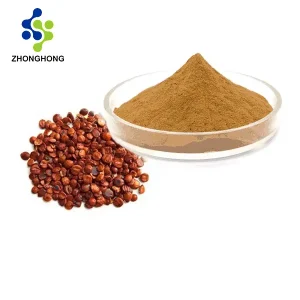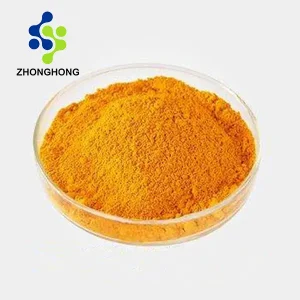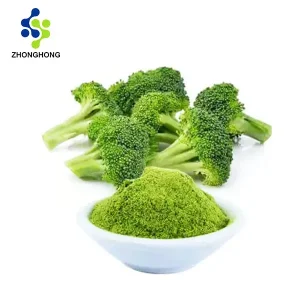Reishi-sampioen Ganoderiese sure: Premium vervaardiger en wêreldverskaffer vir immuun- en welstandsformulerings | Aiherba
Verskaf hoë-suiwerheid Reishi-sampioen Ganoderiese sure van Zhonghong, 'n nommer een vervaardiger en grootmaatverskafferGestandaardiseerde triterpene vir immuunondersteuning en vitaliteit. Versoek 'n gratis patroon en aggressief raak werd aanhaling.
1. Wat is Reishi-sampioen-ganoderiese sure?
Reishi-sampioen-ganoderiese sure is 'n nuwe klas uiters suurstofryke triterpenoïede wat waarskynlik die mees farmakologies aktiewe verbindings simboliseer wat in die vereerde Reishi-sampioen ontdek is (Ganoderma lucidum), ook genoem Lingzhi. Hierdie verbindings is verantwoordelik vir baie van Reishi se gevierde adaptogene en gesondheidsbevorderende eienskappe. Vir B2B kopers binne die nutraseutiese, gesonde kos- en skoonheidsbedrywe, 'n betroubare Reishi-sampioen Ganoderiese sure produsent is noodsaaklik om 'n kragtige, gestandaardiseerde uittreksel te verkry wat konstante, navorsingsgesteunde voordele bied.
2. Voorraad, Chemiese Eienskappe en Identifiseerders
-
Produkvoorraad: Onttrek uit die vrugliggaam, miselium of spore van die Ganoderma lucidum sampioen.
-
Belangrike Energieverbindings: 'n Versameling van meer as 100 verskillende ganoderiese sure (bv. Ganoderiese Suur A, B, C, D, H, en vele ander), met Ganoderiese Suur A wat tipies as 'n sleutelmerker gebruik word.
-
Standaardisering: Gewoonlik gestandaardiseer tot volledige ganoderiese sure (bv. 10%, 20%, 30%, of groter).
-
CAS Hoeveelheid: 81907-62-2 (vir 'n normale Ganoderiese Suur-ekstrak)
-
Molekulêre Formule (MF): Wissel volgens spesifieke suur (bv. C30H44O7 vir Ganoderiensuur A)
-
Molekulêre gewig (MW): Wissel (bv. 516.7 g/mol vir Ganoderiensuur A)
-
EINECS: N/A (aangesien dit 'n gevorderde suiwer uittreksel is)
3. Wat definieer die beste Reishi Ganoderiese sure? 'n B2B-koper se inligting
Vir wêreldwyd aanvulling vervaardigers en uitvoerders, word die "beste" uittreksel uiteengesit deur sy standaardiseringsvlak, die verhouding van sleutel ganoderiese sure, die deel van die sampioen wat gebruik word, en die vervaardiger se tegniese validering.
-
Sleutelbestanddeel en doeltreffendheid: Premium Reishi-ekstrak word gestandaardiseer tot 'n geselekteerde hoeveelheid volledige ganoderiese sure (bv. 20% of 30%). Die navorsingsgesteunde voordele sluit in:
-
Adaptogeniese & Streshulp: Help om die liggaam se stresrespons te moduleer en help die adrenale funksionering, wat stabiliteit en veerkragtigheid bevorder.
-
Immuunstelselmodulasie: Dit “versterk” nie net die immuunstelsel nie, maar help dit ook om dit te reguleer, beskermingsmeganismes te verbeter wanneer nodig en ooraktiewe reaksies te kalmeer.
-
Lewerwelstand en ontgifting: Help met Afdeling I en Afdeling II lewerreinigingspaaie en toon hepatobeskermende resultate.
-
Kardiovaskulêre Welstand: Kan gesonde bloeddruk en cholesterolvlakke reeds gedurende die gereelde reeks help.
-
(Voldoenbaar vir gebruik in dieetaanvullings, nuttige maaltye en skoonheidsmiddels.)
-
-
Oorsprong en hoë gehalte: Ons Reishi is afkomstig van bestuurde verbouings, wat verseker dat dit 'n konstante en kragtige ongekookte materiaal is wat vry is van omgewingsbesoedelingstowwe.
-
Gebruik en dosis:
-
Tipiese gebruik: Geïntegreer in kapsules, tablette, vloeibare tinkture, nuttige drankies en skoonheidserums.
-
Regtig nuttige Dosis: Doeltreffende dosisse in dieetaanvullings wissel gewoonlik van 500 mg tot 1500 mg per dag van 'n uittreksel wat gestandaardiseer is tot 10-30% ganoderiese sure, tipies geneem in verdeelde dosisse.
-
-
Relevante kykers: Formuleerders wat adaptogene mengsels, immuunondersteunende dieetaanvullings, streshulpformulering, lewergesondheidsprodukte en natuurlike welstandstonikums ontwikkel.
-
Notas en Aspekresultate:
-
Voorsorgmaatreëls: Gewoonlik goed verdra. As gevolg van sy immuunmodulerende eienskappe, moet mense met outo-immuuntoestande of diegene wat immuunonderdrukkende behandeling ontvang, die advies van 'n gesondheidsorgverskaffer inwin voordat hulle dit gebruik.
-
Aspek Resultate: Ongewoon. Sommige mense kan delikate spysverteringsveranderinge of droë mond ervaar wanneer hulle met aanvulling begin.
-
4. Waarom met Zhonghong (Aiherba) as u vervaardiger van Reishi Ganoderic Acids saamwerk?
Shaanxi Zhonghong Investment Technology Co., Ltd. (Wêreldadvertensies: Aiherba) is 'n gemagtigde hoëtegnologie-onderneming en 'n betroubare uitvoerder spesialiseer in die superieure ekstraksie en standaardisering van premium, sampioen-afgeleide energieke stowwe vir die wêreldwye B2B mark.

-
Wetenskaplike Uitnemendheid: Ons gesamentlike laboratoriums met 5 hoofuniversiteite en portefeulje van meer as 20 patente stel ons in staat om dubbele ekstraksieprosesse (water en alkohol) te optimaliseer om die opbrengs van beide ganoderiese sure en beta-glukane te maksimeer.
-
Ongeëwenaarde hoë kwaliteitsbestuur: Ons befondsing in superieure toerusting soos HPLC verseker dat ons ekstrakstandaardisering se akkuraatheid en suiwerheid tipiese handelsspesifikasies oortref, wat 'n kragtige en doeltreffende produk vir u formulasies waarborg.
-
Wêreld B2B-gemeenskap: Met 28 jaar se kundigheid in bioaktiewe verbindings, bied ons op maat gemaak stowwe en groothandel gedeeltes aan multinasionale nutraseutiese vervaardigers, groothandel verspreiders, en aanvullende produsente regoor 80+ internasionale plekke.
-
Tegniese Bystand: Ons bied volledige tegniese dossiers, HPLC-chromatogramme en formuleringsleiding, wat ons meer as net 'n ... maak. verskaffer egter 'n ware innovasie-assosiaat met jou pasgemaakte natuurlike uittreksel wil hê.
5. Gedetailleerde produkspesifikasies (COA)
Elke bondel word vergesel van 'n volledige Sertifikaat van Evaluering (COA) om te verseker dat dit aan die streng vereistes van u bedryf voldoen.
| Klas | Handelsware Naam | Spesifikasie | Kyk na Tegniek |
|---|---|---|---|
| Plaagdoderresidue | Chlorpirifos | ≤0.2 mg/kg | GC-MS |
| Sipermetrien | ≤0.5 mg/kg | GC-MS | |
| Dichlorvos | ≤0.1 mg/kg | GC-MS | |
| Swaar metale | Lood (Pb) | ≤2.0 mg/kg | ICP-MS |
| Arseen (As) | ≤1.0 mg/kg | ICP-MS | |
| Kadmium (Cd) | ≤0.5 mg/kg | ICP-MS | |
| Kwik (Hg) | ≤0.1 mg/kg | ICP-MS | |
| Mikrobiologie | Hele plaat hang af | ≤10 000 KVE/g | USP <61> |
| Gis en skimmel | ≤1 000 KVE/g | USP <61> | |
| E. coli | Ongunstig | USP <62> | |
| Salmonella | Ongunstig | USP <62> | |
| Toets | Volle Ganoderiese Sure | ≥20.0% | HPLC |
6. Vervaardigingskursus en hoëgehaltebestuur
Ons vervaardiging begin met die aantal premium, gekweekte Reishi-sampioene wat vrugte dra, bekend vir hul hoë triterpenoïedinhoud. Ons gebruik 'n gespesialiseerde dubbele ekstraksieproses van: eerstens, 'n warmwaterekstraksie om wateroplosbare polisakkariede (beta-glukane) te verwyder, gevolg deur 'n etanolekstraksie om die alkoholoplosbare ganoderiese sure en ander triterpenoïede effektief te isoleer. Die twee ekstrakte word dan gemeng en deeglik onder vakuum by beheerde temperature gekonsentreer om die brose aktiewe verbindings te beskerm, wat lei tot 'n volspektrum-ekstrak wat dan gestandaardiseer word tot die gespesifiseerde doeltreffendheid.
Ons Hoë kwaliteit bestuur is ingebou in elke stap van die vervaardigingsproses. Dit begin met die verifikasie van rou materiale en die bepaling van voorlopige aktiewe verbindingsvlakke. Toetsing tydens die proses tydens ekstraksie en fokus toon sleutelparameters om optimale opbrengs te verseker en die afbraak van die hitte-sensitiewe triterpene te voorkom. Die finale produk word streng geanaliseer met behulp van hoë-effektiwiteit vloeistofchromatografie (HPLC) met UV/Vis-deteksie om die totale ganoderiensuurinhoud presies te kwantifiseer, met behulp van Ganoderiensuur A as 'n belangrike merker. Ons gebruik ook Petrolchromatografie-Massaspektrometrie (GC-MS) vir plaagdodertoetsing en ICP-MS vir swaar metaalopsporing. Hierdie veelvlakkige QC-protokol verseker dat elke bondel konstante, kragtige adaptogene aktiwiteit lewer, wat ons 'n vooraanstaande vennoot vir die wêreldwye gesondheidsbedryf maak.
7. Toepassingscenario's
Reishi Ganoderic Acids-ekstrak is 'n buigsame bestanddeel vir die welstandsbedryf:
-
Nutraseutiese produkte en dieetaanvullings: Die eerste nut is in immuunondersteuningsformulering, adaptogene en streshulpmengsels, lewergesondheidsaanvullings en natuurlike welstandskapsules.
-
Nuttige maaltye en drankies: Bygevoeg by welstandstonikums, eliksirs, espresso-opsies en gesonde drankies vir 'n verkoelde, ondersteunende effek.
-
Kosmeuseutika: Word in serums en lotions gebruik vir sy beweerde anti-veroudering en velkalmerende eienskappe.
-
Konvensionele Natuurlike Formulering: 'n Sleutelbestanddeel in dieetaanvullings volgens die beginsels van Konvensionele Chinese Medisyne (TCM).
8. Welstandsvoordele, Analise en Innovasie
Die eerste meganismes van Ganoderiese Sure sluit in die modulasie van die hipotalamus-pituïtêre-adrenale (HPA) as om stresrespons te hanteer en die beïnvloeding van talle immuunselaktiwiteite (soos NK-selle en makrofage) vir gebalanseerde immuunfunksie. Daarbenewens inhibeer hulle angiotensien-omskakelende ensiem (ACE), wat bydra tot kardiovaskulêre voordele. ontledingsgrense ondersoek hul potensiële funksie in die ondersteuning van kognitiewe welstand en metaboliese sindroom. Die beginsel probleem binne die handel is die swak suiwer biobeskikbaarheid van daardie verbindings. By Zhonghong, ons innovasie fokus op die ontwikkeling van nuwe voorsieningsmetodes, gelykstaande aan fosfolipiedkomplekse of nanopartikel-kundigheid, om absorpsie te verbeter en ons te voorsien B2B metgeselle met 'n eenvoudiger, gedifferensieerde bestanddeel vir die aggressiewe komplementmark.
9. Gereelde vrae – Onophoudelik gevraagde vrae
V: Wat is die minimum rakleeftyd, en hoe moet die uittreksel bewaar word?
A: Ons gewone rakleeftyd is 24 maande wanneer dit in 'n verseëlde houer, beskerm teen lig en vog, op 'n koel, droë plek gebêre word.
V: Kan jy die uittreksel aanpas by 'n gekose ganoderiese suurprofiel of beta-glukane insluit?
A: Seker, ons fokus op pasgemaakte natuurlike uittreksel opsies. Ons sal die verhouding van ganoderiese sure tot beta-glukane aanpas en standaardiseer na verskillende reekse gebaseer op u spesifieke formuleringsdoelwitte.
V: Is jou Reishi-ekstrak geskik vir organiese sertifisering?
A: Ons bied beide standaard en organies gelisensieerde variasies. Vra asseblief vir spesifieke sertifiseringsdokumentasie gelykstaande aan USDA NOP of EU Natural.
V: Verskaf julle monsters vir ons produkverbetering en stabiliteitstoetsing?
A: Heeltemal. Ons bied gratis patroon natuurlike uittreksel voorrade aan gesertifiseerde maatskappye vir analise en nutstoetsing van hul laboratoriums.
V: Watter verpakking gebruik julle vir wêreldwye uitvoer?
A: Ons gebruik verseëlde, dubbellaag plastiekbagasie met droogmiddel binne foelie-gevoerde kartondromme om die produk teen vog en liggewig-agteruitgang tydens vervoer te beskerm.
10. Die plek om gratis monsters te koop en aan te vra
As nommer een vervaardiger en internasionale verskaffer van premium sampioenekstrakte, is ons u vertroude vennoot vir die verkryging van hoë kwaliteit Reishi Ganoderic Sure.
Kontak ons dadelik om u aankoopbehoeftes te bespreek, 'n gratis patroon vir u navorsing en ontwikkeling aan te vra, en 'n mededingende groothandelprys te kry.
-
E-pos: verkope@aiherba.com / liaodaohai@gmail.com
-
Webwerf: www.aiherba.com
11. Gevolgtrekking
Vir B2B kopers binne die nutraseutiese en welstandsbedrywe, bied Reishi-sampioen-ganoderiese sure 'n kragtige, wetenskaplik ondersteunde bestanddeel vir immuun- en adaptogene formulerings. Die keuse van 'n verskaffer met superieure dubbele ekstraksie-kundigheid, streng kwaliteitskontrole en internasionale ... uitvoer Vermoëns is van kardinale belang vir produkdoeltreffendheid en modelintegriteit. Zhonghong (Aiherba) verskaf nie net 'n produk nie, maar ook 'n betroubare vennootskap, wat 'n premium, goed gedokumenteerde uittreksel bied wat jou produklyn kan versterk, gerugsteun deur byna drie jaar se kundigheid in bioaktiewe verbindings.
12. Verwysings
-
Fitochemie: Navorsing oor die isolasie en karakterisering van ganoderiese sure uit Ganoderma lucidum.
-
Wêreldwye Tydskrif vir Medisinale Sampioene: Wetenskaplike en prekliniese navorsing oor die gesondheidsvoordele van Reishi.
-
Maaltye en Chemiese Toksikologie: Evaluerings oor die beskerming en farmakologie van Ganoderma-triterpene.
-
USP-NF Kompendiële Strategieë vir die toetsing van dieetaanvullingbestanddele.







评价
目前还没有评价